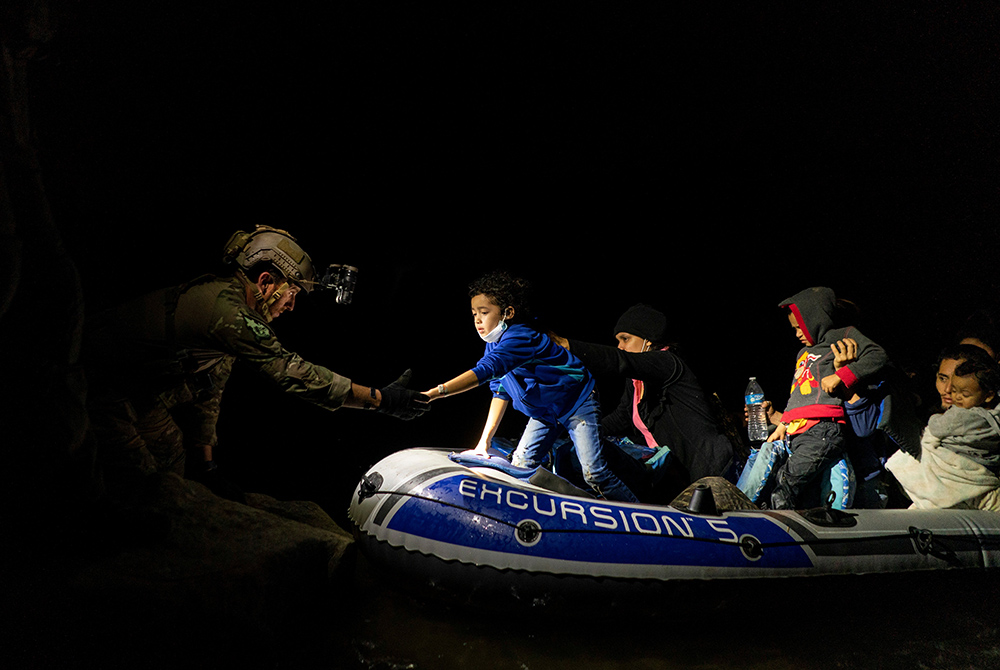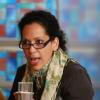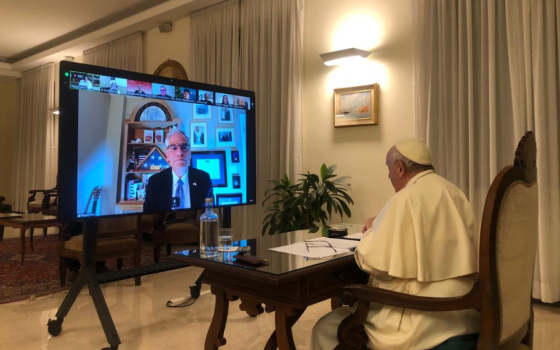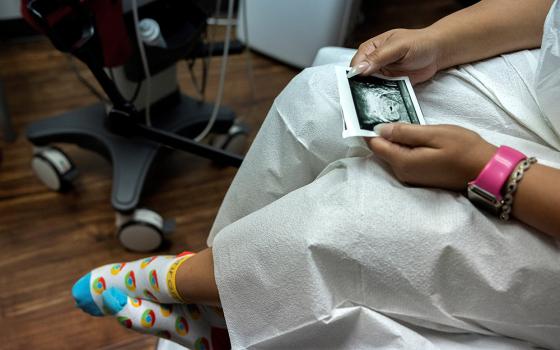
Migrants seeking asylum in the U.S. attempt to get off an inflatable raft with the help of a Texas Ranger officer April 5, 2021, in Roma, Texas, after they crossed the Rio Grande from Mexico. (CNS/Go Nakamura, Reuters)
Once again our attention is at the U.S.-Mexico border. Increased news media attention to the situation of minors in immigration detention centers highlights challenges brought on by new waves of people, many of them unaccompanied minors, seeking to escape profound violence and the ongoing impacts of natural disasters and the pandemic at home.
President Joe Biden has assigned a new role to Vice President Kamala Harris to oversee conditions at the border and to engage in diplomatic efforts with nations of origin to understand the major push factors leading migrants to undertake a perilous journey to the U.S. Her responsibilities include shaping diplomacy and coordinating aid efforts to more effectively address the situation.
Bishops at the U.S.-Mexico border expressed concern over conditions of migrants trying to reach the U.S. under the assumption that they will find relief from their plight because of recent changes in immigration policies. In their joint statement, the bishops on both sides confirmed, "For most, the decision to migrate is not motivated by indifference toward their homeland or the pursuit of economic prosperity; it is a matter of life and death."
To the humanitarian challenge brought on by this influx of vulnerable persons the bishops respond unequivocally:
We renew our appeal to our governments, to political leaders, and civil society, that they work together to welcome, protect, promote, and integrate migrants according to their intrinsic dignity, as well as work with other countries in the region to eliminate conditions that compel their citizens to resort to dangerous and irregular migration, producing long-term solutions (from the joint statement of U.S. and Mexican Bishops).
Welcome, protect, promote, integrate. Under Pope Francis these four verbs have become the rubric shaping pastoral, ethical and political recommendations for responses to migrations globally that faithfully witness to Christian discipleship and respect the human dignity of peoples on the move.
The vulnerability of migrants, and the responsibility of receiving nations to tend to them, are privileged in Francis' most recent encyclical, Fratelli Tutti. Altogether, migrants and their plight are mentioned over 30 times throughout the document, equal in concern only to the poor. While the letter is officially dedicated to "fraternity and social friendship," Francis proposes that welcoming, protecting, promoting and integrating migrants are key markers of truly human fraternity and friendship. Because of this, the document could also be considered a treatise on welcoming the stranger, a map for nations and societies to better understand how to respond to this most critical sign of the times. Francis' articulation of this phrase — welcome, protect, promote, integrate — is not new in the social teaching of the church, but follows over 100 years of the church's dedication to the special concern for the welfare of migrants and refugees.
Advertisement
Drawing from the principle of the common destination of the goods of creation, Fratelli Tutti offers "a different way of understanding relations and exchanges between countries." It continues:
If every human being possesses an inalienable dignity, if all people are my brothers and sisters, and if the world truly belongs to everyone, then it matters little whether my neighbor was born in my country or elsewhere. My own country also shares responsibility for his or her development, although it can fulfill that responsibility in a variety of ways. It can offer a generous welcome to those in urgent need, or work to improve living conditions in their native lands by refusing to exploit those countries or to drain them of natural resources, backing corrupt systems that hinder the dignified development of their peoples (Paragraph 125).
While every wave of migrants at the border is often presented by the media and political pundits as a crisis and a threat to our resources and security, our common humanity ought to ground our responses. Fratelli Tutti insists, "All individuals, whatever their origin, know that they are part of the greater human family, without which they will not be able to understand themselves fully. … No one people, culture or individual can achieve everything on its own." (Paragraphs 149 and 150).
Our current moment challenges us as to how best to respond to the call to welcome, protect, promote and integrate those who arrive at our borders seeking safety in a land not their own. Pope Francis asks us to recognize them not as usurpers of unearned goods, but as essential to the very fabric of who we are, a critical piece of our self-understanding, and contributors to the common good.
It is imperative that all the faithful in the U.S. carefully consider the map laid out for us by Pope Francis in Fratelli Tutti and elsewhere when considering how to transform a broken immigration system that makes vulnerable people, especially children, even more vulnerable.
The first set of images coming from detention centers housing minors under the current administration evidence the fact that we have yet to incorporate this sense of a shared and common humanity into our immigration system, especially as it concerns the processing of the asylum claims of unaccompanied minors.
Biden's language around this moment in our story of immigration echo some of the essential principles of Catholic social teaching. However, it remains to be seen whether the rest of the church in the U.S. is willing to join the bishops at the border in promoting more humane policies, including establishing more efficient mechanisms for processing unaccompanied minors.
It is imperative that all the faithful in the U.S. carefully consider the map laid out for us by Pope Francis in Fratelli Tutti and elsewhere when considering how to transform a broken immigration system that makes vulnerable people, especially children, even more vulnerable. More importantly, we must continually ask whether our policies and practices toward "the stranger" witnesses to our common humanity, and the social assertion that "no one is saved alone. … Nowadays we are either all saved together or no one is saved" (Fratelli Tutti, Paragraphs 32 and 137).








